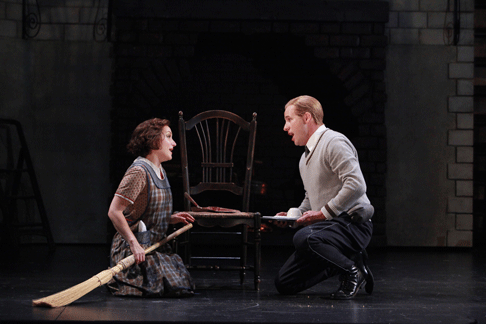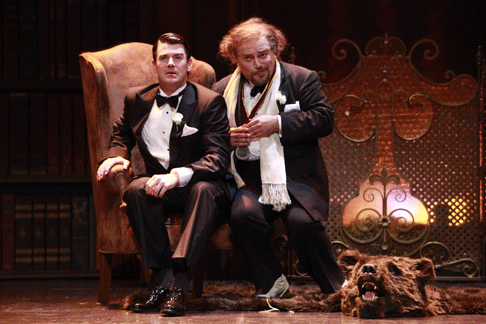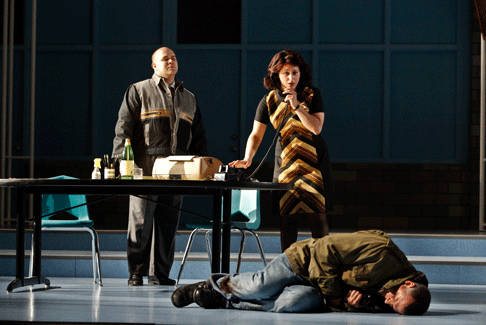23 Aug 2009
Stars Shine at Glimmerglass
Everyone once in a while, we veteran opera-goers are privileged to see a promising artist give a break-out performance that announces a giant step forward into major stardom.

Everyone once in a while, we veteran opera-goers are privileged to see a promising artist give a break-out performance that announces a giant step forward into major stardom.
Such was the case with the wholly exceptional Dandini from the exciting young baritone Keith Phares in Glimmerglass’s quite delightful Cenerentola One third into the first act of the Rossini (up to that point a wholly competent, if not yet quite sparkling rendition), Mr. Phares strode on through the door stage left, and did not so much inhabit the stage as take complete ownership of it.
His first few utterances — virile, vibrant, “present” — caused the audience to sit up as one with immediately increased interest. Indeed, having thrown the gauntlet of vocal excitement and dramatic commitment in his opening aria, he urged the entire evening to a much higher level. I have been a great admirer of this fine singer since I first encountered him in Miss Havisham’s Fire and Loss of Eden in St. Louis, December Songs in Houston, and (again at St.Louis) Una Cosa Rara.
But nothing in his excellent prior work could have prepared me for this star-making role assumption. His voice now had even greater point and focus, his lower range filled the house without pushing, his trip-hammer melismas were spot-on, and his sassy upper register had a thrilling ping. His acting, always finely detailed, was on this occasion a veritable tour-de-force, totally in charge and in your face, and characterized by wryly funny gestures and takes. He was just up there having a hell of a good time, and so were we. And it does not hurt that he is as handsome as a young Alec Baldwin.
What a joy to anticipate the doors that should now open to him at the world’s major houses. The buzz at intermission was “who is that Dandini?” Keith, I do believe you have “arrived.” A well deserved triumph for an artist with a great future.
Not that he was alone in his success. Julie Boulinanne had considerable, if qualified success as Angelina. There seemed to be a couple of different vocal approaches in play. I found the introspective phrases were (only) sometimes over-interpreted, with the sense of line occasionally weakened by a syllable-to-syllable approach reminiscent of the notorious Schwarzkopf master classes of her later years.
‘Non piu mesta’ was very decently sung, if not yet in the category of bravura vocalizing. Ms Boulinanne’s somewhat darkened voice and variable technique(s) don’t seem to let whole phrases ring out and sail with consistently focused tone (although any number of top notes were admittedly thrilling). She is petite and quite appealingly sympathetic on stage, although at first her characterization made the girl come across as “simple” thanks to a hangdog expression and a stoop-shouldered, straight-legged mincing walk. Once past that first mis-directed dramatic conception, our heroine had spunky appeal galore.
Aduardo Chama’s Don Magnifico was a polished offering: fun-filled, inventive, uninhibited, and spontaneous. If his slightly orotund voice sagged occasionally on repeated pitches in patter segments, and if he was a bit rhythmically imprecise at times, his well-schooled portrayal had the requisite fire, humor, and stylistic aplomb.
 Julie Boulianne as Angelina and John Tessier as Don Ramiro [Photo by Richard Termine/Glimmerglass Opera]
Julie Boulianne as Angelina and John Tessier as Don Ramiro [Photo by Richard Termine/Glimmerglass Opera]
John Tessier cut a fine figure as Don Ramiro. His bright lyric voice was a little more open than usual for this Fach, perhaps to instill some body and volume, although the upper extension lightens a bit as it turns over giving it a slightly different color. But he has definitely got the goods. Mr. Tessier offered good florid passage work, was blond and boyish, appeared at ease on stage, and maintained an excellent rapport with Dandini in their conspiratorial hi-jinks.
Other roles were drawn from the ranks of the Young American Artists. Alidoro’s Joshua Jeremiah was arguably a piece of curious casting. Although he acquitted himself well enough, he was in fact too young looking for the part, and his mellifluous voice wanted a little more heft. Clorinda and Tisbe were conceived as a ‘T&A’ duo (and I don’t mean ‘treble and alto’), a concept that was well embodied by (respectively) Jamilyn Manning-White (with an appealing hint of metal in her voice, sporting a pink formal with a huge bow highlighting her ‘T’ contribution to the equation); and Karin Mushegain (a rich-voiced mezzo whose green slit dress accented her, um, ‘A’-ssets).
In the pit, pride of place must go to Jonathan Kelly who contributed excellent work on the harpsichord. Conductor Joseph Colenari was another matter. For all his high-powered credits, on this occasion the maestro led a reading that was too often rhythmically dodgy in the sprightly ensembles, most notably resulting in a scrappy stretta section of the Act I quintet. Group cut-offs were raggy, and he occasionally pushed the singers past the speed limit, especially Magnifico. While the usually fine orchestra may have had its share of minor scrapes, not so the excellent chorus, wonderfully polished to precision by Bonnie Koestner.
 Keith Phares (left) as Dandini and Eduardo Chama as Don Magnifico [Photo by Richard Termine/Glimmerglass Opera]
Keith Phares (left) as Dandini and Eduardo Chama as Don Magnifico [Photo by Richard Termine/Glimmerglass Opera]
The momentary lapses in tidiness are not be blamed on the fine stage director, Kevin Newbury, who staged the tricky ensembles with masterful positioning and controlled business so the cast could indeed watch the conductor. Mr. Newbury showed especial skill in deploying the chorus meaningfully, and with individualized personalities. Overall, his work with the principles was similarly inspired, honoring tradition but with barely a Rossinian cliche in sight. Clever, clever work.
Cameron Anderson gave his director a beautifully atmospheric, highly functional set design. Transplanting the tale to the 1930’s was a brilliant touch that put into high relief the contrast between the struggling impoverished populace and the monied, privileged few. The large expanse of Magnifico’s (now) sparsely furnished house with its walk-in hearth, mirthless staircase, and offstage kitchen, was backed by a bleak wall with a single bare window through which falling snow was glimpsed. Comic touches were injected with well- considered set pieces, for example, a bathtub gin wagon, that suitably lightened the proceedings, if not with the heady fizz of fine champagne, at least with the nose-tickling bubbles of tart ginger ale.
The paneled library in Ramiro’s palatial mansion was a handsomely sober location for the social climbing (and subsequent celebration) that is at the core of the libretto. The deployment of a large standing globe as focal point in several musical numbers was comically effective. Mr. Anderson made excellent use of an ‘in-one’ scenic device, in which the unemployed were served food by charity volunteers in front of a “No work available today” sign that was flown in.
Jassican Jahn’s lovely costumes (including the sisters’ T&A numbers, referenced above) served the concept well. She fashioned lovely ball attire for Angelina, which featured a nice solution to the usual veil by incorporating a sweeping feather that extended in front of her face from her hat. Regal men’s uniforms, natty formal attire, well-worn winter coats and hats, all of the clothing was exceptionally well-coordinated. Anne Ford-Coates contributed the meaningful hair and make-up design.
Rounding out the technical achievement, D.M. Wood devised a considerably varied lighting plot with nice area definition, good color filter choices, excellent mood enhancement, and plot-specific specials, like the requisite lightning for the formulaic storm scene. But I have to ask: thunder, lightning, and . . .snow? Well, something else to blame on El Nino.
At the end of the night, momentary musical glitches aside, this audience was mightily entertained, witness the cheering reception. Glimmerglass has a substantial hit on its hands.
Conversely, the next day’s The Consul was near musical perfection, but encountered some dramatic mis-steps. Conductor David Angus led a taut, clean reading of Menotti’s masterpiece that was beautifully shaped by an orchestra collaborating in top form. This is a rather lean (and imaginative) instrumentation, scored as it was to fit in a Broadway pit for the opera’s premiere. At times, perhaps, certain selections were a bit rushed (the Police Chief’s scenes might have captured a more measured menace), and a few moments sounded a bit “correct” as opposed to being emotionally “informed.” But overall, this was a tremendous musical effort.
The star performance of this production came from veteran Joyce Castle, a treasureable singer who always seems at the top of her game. Her experienced Mother was a model of well-rounded, theatrically rich impersonation, impeccably sung. She seems to bring even more to the role than Menotti conceived, and she finds the truth in even such potentially embarrassing moments as the peek-a-boo game with the baby, which has reduced many a mezzo to self conscious gyrations that come off as a tipsy faux granny. I am not sure how old Ms. Castle is (there is a 40th anniversary fete somewhere listed in her bio). But she is still singing with imagination, security, beauty of tone, and heartfelt phrasing. Joyce, I can only hope you give us another 40 years, enriching the opera scene as few do.
 L to R: Robert Kerr as The Secret Police Agent, Leah Wool as The Secretary and Michael Chioldi as John Sorel. [Photo by Richard Termine/Glimmerglass Opera]
L to R: Robert Kerr as The Secret Police Agent, Leah Wool as The Secretary and Michael Chioldi as John Sorel. [Photo by Richard Termine/Glimmerglass Opera]
Magda is the leading character, of course, and it is her journey on which the melodrama rises or falls. We were fortunate with the very gifted Melissa Citro, a jugend-dramatisch soprano of distinction and promise. In the beginning I may have wished for a bit more Italianate temperament and warmth of sound — Menotti is a musical descendant of Puccini, after all. But I reminded myself that the demanding, wide-ranging “Paper Aria” has been co-opted by a number of dramatic sopranos. Eileen Farrell regularly included it on her recitals and Christine Brewer just recorded it. Vocally, Ms. Citro acquitted herself very well indeed, nailing all the big climactic moments like the world-class Sieglinde-in-the-wings that she is. It was arguably not her fault that she was allowed to appear a bit too robust, and sing too much on the surface to be wholly effective as such a disintegrating, imploding character.
Michael Chioldi (John ) has a richly pleasing baritone of substantial weight, but I wish he hadn’t turned the volume knob up quite so high on climactic high notes causing him to momentarily lose the center of the pitch. Leah Wool put her secure mezzo to good use in her traversal of the largely unsympathetic Secretary, although she failed to find much variety in the part even when opportunities presented themselves (and they do). David Kravitz sang competently as a rather droopy Mr. Kofner who could have taken the stage a bit more. Tenor John Easterlin enjoyed a minor triumph as The Magician, showing off a rich upper register, and flawlessly executing the myriad of entertaining magic tricks devised by Peter Samelson.
The Young American Artists again filled out the cast to good end. Jacqueline Noparstak contributed an attractive (if not yet distinctive) sound and too-cautious Italian as the Foreign Woman; Robert Kerr impressed as the Secret Police Agent with solid legato married to secure climatic high notes; Eve Gigliotti brought an interesting color and look to Vera Boronel; Valentina Fleer’s slim soprano had a shimmering clarity above the staff as Anna Gomez (and her look seemed to be channeling Penelope Cruz); and best of all, Kevin Wetzel understood and communicated every word he sang with hushed, intensely focused tone as a totally convincing Assan.
I greatly admire director Sam Helfrich, but here he did not seem to know what to do with the piece. And he was not helped by designer Andrew Lieberman’s ill-defined tiers of platforms, fluid floor plans, obstructive fences and posts, and an overall muddle of a playing space. The backstage wall, pockmarked with various doors and windows, could have been a factory or warehouse or bunker or housing project, or simply none of the above. The pair did not realize the (intriguingly) good intention of their program note which proposed to establish that the characters are inter-related in ways outside of the consul’s office. But, good intentions aside, in a piece that is all about confinement, limitation, and an unstoppable, tragic entrapment, there was no visual suggestion of this in the wide open scenic construction, nor in the confusing direction.
Kaye Voyce’s costumes attempted to be universal and from different periods, but ultimately they were not unified in their look nor character specific. Magda was greatly hindered by being attired like a clean-cut Wal-Mart shopper. Jane Cox’s competent lighting was at least utilitarian, although it, too, failed to do much to establish mood or to isolate important moments.
There was a damaging lack of chemistry between John and Magda and Mother, mostly owing to blocking that did not really arise from character motivation. Spatial relationships were confusing with the Sorel apartment expanding, shrinking, or moving at will. The Mother sings of seeing a neighbor wife clinging desperately to her husband who is being led away, but clearly is not placed in a way to be seeing them. The broken window “signal,” critical to the plot, is physically misplaced, and the actors simply ignore it.
Most problematic, Magda’s suicide (oops, sorry, now ya know!) is not only way too far upstage, but it is willfully unclear. She seems to just. . .expire. . .sitting up. . .after having oh-so-slowly torn up the damnable bureaucratic papers. Death-by-paper-cut just don’t make it here, Sam! Helfrich and company have ignored specific stage directions at their (and our) peril. Mr. Menotti understood well the melodramatic structure the piece needs. Future producers would be wise to indulge it.
A poll of my fellow B&B guests over morning repast revealed that one of them had fled after Act One and the other two followed suit at the second intermission. When a sure-fire, well-crafted piece like The Consul isn’t keeping people in their seats, especially one that is this musically excellent, it seriously deserves to be re-tooled.
James Sohre